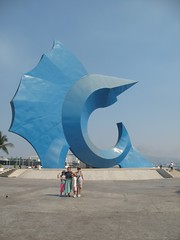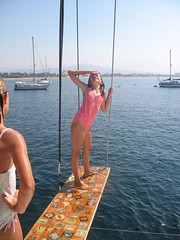Turning Around
What an odd feeling to be sailing past coastline we have already seen. For the first time since we turned left at Cape Scott, we are treading ground... or more accurately floating over seas... we've already seen and done.
Time is backwards in the Mexican cruising ground. Hard for us to remember down here that in Seattle and Vancouver, Calgary, Portland and San Francisco, the wind is blowing, the rain is falling, and the temperatures require thick blankets, fluffy comforters, and heavy coats. We live in the land of perpetual sun, gentle breezes, hot afternoons and cool evenings. We spend our days avoiding the intensity of direct light, our evenings drinking sun downers on the deck, our nights watching the stars fall out of their orbit and blaze a path to the spangled darkness of the sea. The weather reports are so consistently dull, even the most salty sailor grows complacent and starts to sleep through Don's endless morning chatter on Amigo net.
Now as our season draws to a close, we must all race either north or south to avoid the harsh weather soon to come. The “winter” of the cruising world is the hurricane season which starts in June and runs to roughly November. During this little winter, cruisers flee hot, humid Mexico to visit family in the North or bungalows in the cooler mountains of the central part of the country. Boats must be moved out of the hurricane belt, generally defined by the insurance companies to mean south of Guatemala or north of Mazatlan and La Paz.
So here we are floating the Mexican Riviera, and the time has come to make a decision: north, south, or west. At the end of January, early February, every boat must commit in order to get moved out of the danger zone before the weather turns. The distances in all three directions are actually quite substantial. While we shot down here from Mazatlan to Zihua in roughly two weeks, we now face a 700 mile upwind bash to get back to the Sea of Cortez. Those planning a puddle jump over to the South Pacific have, of course, a considerably farther distance, albeit downwind. Those contemplating the Panama must play dodge with increasingly vicious winds passing from the Gulf of Mexico over the narrowest part of Mexico and blowing with almost sentient ferocity through the Tuanepec.
Don Quixote always planned to head north, back up into the Sea of Cortez to end our first cruising year. DrC's return to the boat in early February signaled an end to our downwind exploration of new coastline. On our return voyage, the family agreed to take our time. First, the trip north is a considerably more challenging sail as we anticipate a sizable portion will involve a bash directly into the prevailing northwest seas and winds. Second, we feel as though we missed too much in our rapid dash south. We'll take our time drifting northwards, stopping in at our favorite haunts to explore them more thoroughly, visiting harbors and anchorages we blew past on our speed run.
I have mixed feelings about turning around. There is the oddest sensation of disappointment. We're not boldly going where no s/v Don Quixote Conger family has gone before. Without the newness, are we still doing something special? Honestly, I don't know where I get these silly notions. My girls would be special in a track house in white suburbia: specially pretty, specially smart, specially charming, specially shitty and annoying. DrC is a stud muffin going into his mid-forties looking like an advertisement for Cruising GQ. And Beach Access not withstanding, Don Quixote can stand on her own as a special craft worthy of attention, notice, admiration. So unless I've complete run out of things to write about, I'm still surrounded in a world of uniquely bright moments, a life full of discovery, hard work, and dirt. Familiarity with the coastline does not render us suddenly average nor does it diminish the value of what we're doing with and for each other.
It may be time to define moving forward less literally. The demands of the cruising life have driven our thinking for nearly two years pushing us always towards new destinations and experiences. Nautical miles and the names of cities gradually replaced our language for describing how we as a family changed, grew, and progressed.
Turning around changes the metric. Dig deeply, Conger clan, to find less geographic milestones to describe the evolution of our sense of family and purpose. Because I can assure you, children mine and handsome hubby, we're not moving backwards. Not yet. Hopefully, not ever.
Author's Note: This was written in late January in Ixtapa just as we started north.
Time is backwards in the Mexican cruising ground. Hard for us to remember down here that in Seattle and Vancouver, Calgary, Portland and San Francisco, the wind is blowing, the rain is falling, and the temperatures require thick blankets, fluffy comforters, and heavy coats. We live in the land of perpetual sun, gentle breezes, hot afternoons and cool evenings. We spend our days avoiding the intensity of direct light, our evenings drinking sun downers on the deck, our nights watching the stars fall out of their orbit and blaze a path to the spangled darkness of the sea. The weather reports are so consistently dull, even the most salty sailor grows complacent and starts to sleep through Don's endless morning chatter on Amigo net.
Now as our season draws to a close, we must all race either north or south to avoid the harsh weather soon to come. The “winter” of the cruising world is the hurricane season which starts in June and runs to roughly November. During this little winter, cruisers flee hot, humid Mexico to visit family in the North or bungalows in the cooler mountains of the central part of the country. Boats must be moved out of the hurricane belt, generally defined by the insurance companies to mean south of Guatemala or north of Mazatlan and La Paz.
So here we are floating the Mexican Riviera, and the time has come to make a decision: north, south, or west. At the end of January, early February, every boat must commit in order to get moved out of the danger zone before the weather turns. The distances in all three directions are actually quite substantial. While we shot down here from Mazatlan to Zihua in roughly two weeks, we now face a 700 mile upwind bash to get back to the Sea of Cortez. Those planning a puddle jump over to the South Pacific have, of course, a considerably farther distance, albeit downwind. Those contemplating the Panama must play dodge with increasingly vicious winds passing from the Gulf of Mexico over the narrowest part of Mexico and blowing with almost sentient ferocity through the Tuanepec.
Don Quixote always planned to head north, back up into the Sea of Cortez to end our first cruising year. DrC's return to the boat in early February signaled an end to our downwind exploration of new coastline. On our return voyage, the family agreed to take our time. First, the trip north is a considerably more challenging sail as we anticipate a sizable portion will involve a bash directly into the prevailing northwest seas and winds. Second, we feel as though we missed too much in our rapid dash south. We'll take our time drifting northwards, stopping in at our favorite haunts to explore them more thoroughly, visiting harbors and anchorages we blew past on our speed run.
I have mixed feelings about turning around. There is the oddest sensation of disappointment. We're not boldly going where no s/v Don Quixote Conger family has gone before. Without the newness, are we still doing something special? Honestly, I don't know where I get these silly notions. My girls would be special in a track house in white suburbia: specially pretty, specially smart, specially charming, specially shitty and annoying. DrC is a stud muffin going into his mid-forties looking like an advertisement for Cruising GQ. And Beach Access not withstanding, Don Quixote can stand on her own as a special craft worthy of attention, notice, admiration. So unless I've complete run out of things to write about, I'm still surrounded in a world of uniquely bright moments, a life full of discovery, hard work, and dirt. Familiarity with the coastline does not render us suddenly average nor does it diminish the value of what we're doing with and for each other.
It may be time to define moving forward less literally. The demands of the cruising life have driven our thinking for nearly two years pushing us always towards new destinations and experiences. Nautical miles and the names of cities gradually replaced our language for describing how we as a family changed, grew, and progressed.
Turning around changes the metric. Dig deeply, Conger clan, to find less geographic milestones to describe the evolution of our sense of family and purpose. Because I can assure you, children mine and handsome hubby, we're not moving backwards. Not yet. Hopefully, not ever.
Author's Note: This was written in late January in Ixtapa just as we started north.

